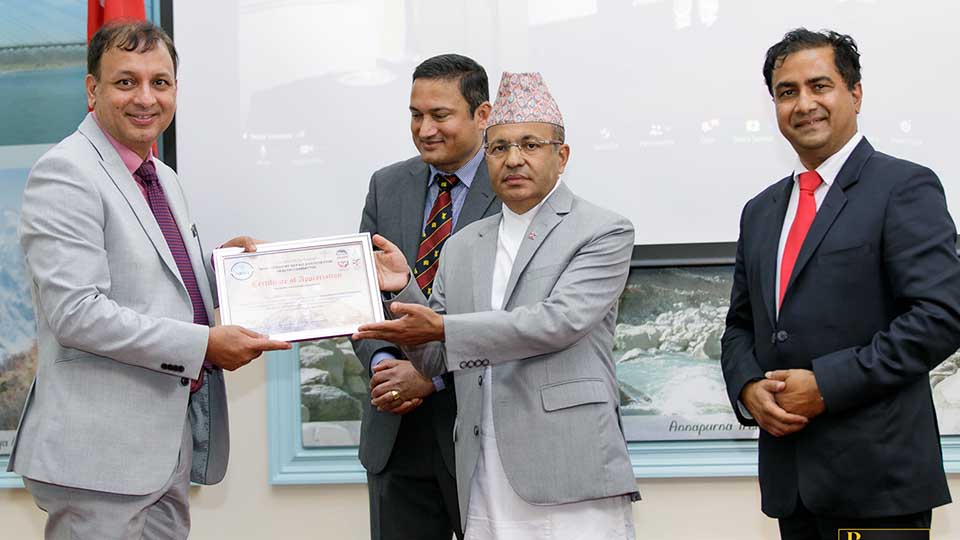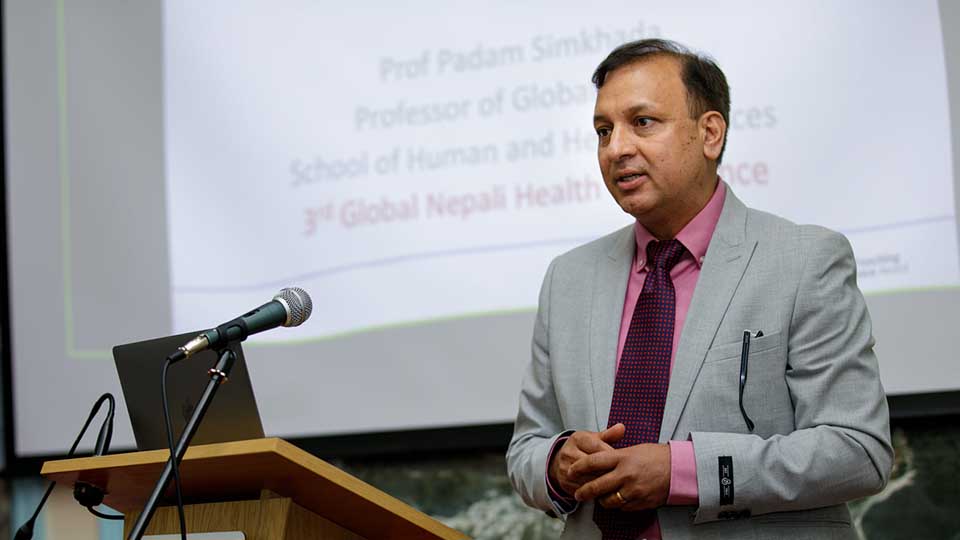Academics and researchers from the University of Huddersfield played a key role at a recent conference that assessed health issues for the global Nepalese community in light of the Covid-19 pandemic.
Padam Simkhada, Professor of Global Health, and a team from the University's School of Human and Health Sciences spoke at the 3rd Global Nepali Health Conference in September which included sessions that took place at the Nepalese Embassy in London.
Over 1,000 delegates from 85 countries attended the three day-long hybrid event, 'Holistic health in the era of pandemic and beyond'. Five of the sessions were co-chaired by post graduate researchers from School of Human and Health Sciences - Anju Vaidya, Manisha Singh, Manju Karmacharya. Pasang Tamang and Shraddha Manandhar.
His Excellency Lokdarshan Regmi, Nepal's Ambassador to the UK, also attended in person while Nepal's Health Minister Umesh Shrestha contributed remotely.
 Professor Padam Simkhada (left) makes a presentation to Lokdarshan Regmi, Nepal's Ambassador to the United Kingdom
Professor Padam Simkhada (left) makes a presentation to Lokdarshan Regmi, Nepal's Ambassador to the United Kingdom Migrant populations hit hard by Covid-19
Issues that have affected the Nepali community, which numbers around 100,000 in the UK, during the pandemic also have relevance among other nationalities of migrants in this country and elsewhere.
"The whole message was the need for a more comprehensive health care system to deal with these problems. The migrant populations are badly affected by Covid," says Professor Simkhada. "Factors such as people are living in a new place who don't know how to access services, and there is the language barrier. This is partly due to structural problems, some people are not allowed to access parts of the health service system, and not just in the UK but all over the world.
"There was a good discussion and a clear message about how Covid has had an impact on vulnerable populations, and among them is this migrant population who live outside their own country, and they are affected more.
"There's a lack of social support, mental health problems and the suicide rate has gone up. Domestic violence went up in lockdown. One paper looked at deaths among Nepalese migrant workers and why they are more vulnerable, and there is clear evidence they are indeed more vulnerable.
 Professor Padam Simkhada speaking at the 3rd Global Nepali Health Conference
Professor Padam Simkhada speaking at the 3rd Global Nepali Health Conference Vaccine hesitancy a major issue
"One of our PhDs presented a paper on vaccine uptake and vaccine hesitancy, why the BAME population is not willing to take the vaccine in comparison to other parts of the population - all very timely and relevant. It is something that could go wider, as UK government is looking at why certain groups are not taking up the vaccine."
In addition to health-related issues, help for early career researchers was also on the agenda with Dr Bibha Simkhada, Senior Lecturer in Adult Nursing, leading a skill-building workshop on 'How to write a scientific paper'.
"The skill-building workshop focused on trying to develop skills for early career researchers and academics, while we also had a symposium about vaccines," Prof Simkhada adds. "There were sessions about mental health and six different thematic scientific sessions. The University had a hugely significant presence at the conference, which will benefit not just the global Nepali community but the wider population.
"We are incredibly grateful to His Excellency the Ambassador and everyone at the Nepal Embassy for their help, and we look forward to further fruitful collaborations."






